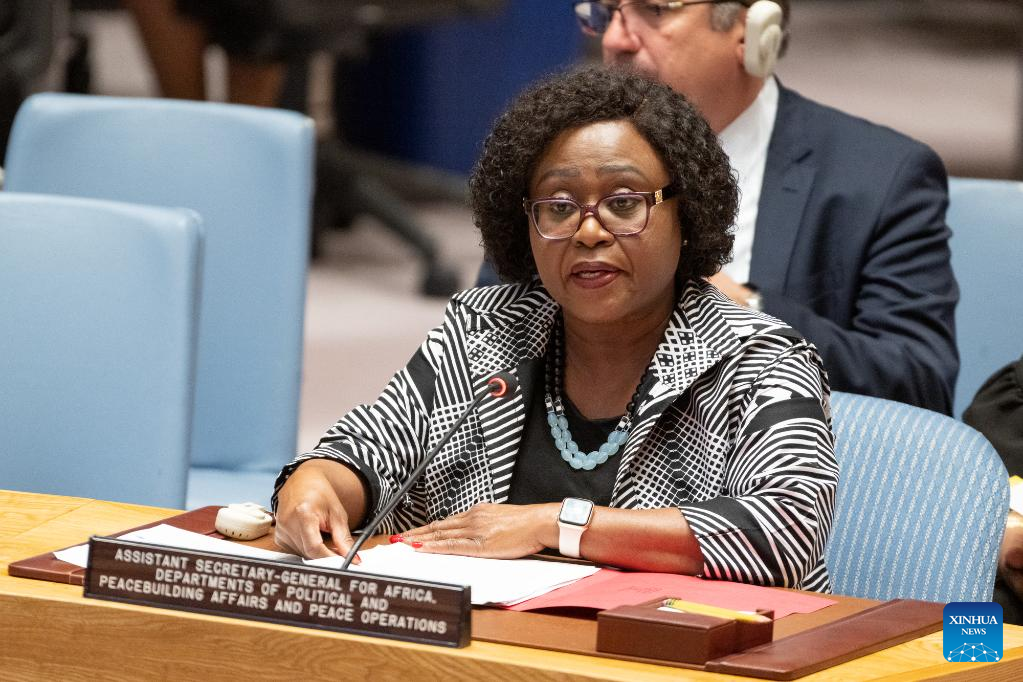
UN Assistant Secretary-General for Africa Martha Pobee speaks at a meeting of the UN Security Council at the UN headquarters in New York on May 16, 2023. The international community's support for the joint military force of the Group of Five for the Sahel (G5 Sahel) has fallen short of making the force fully operational, Martha Pobee said on Tuesday. (Eskinder Debebe/UN Photo/Handout via Xinhua)
UNITED NATIONS, May 16 (Xinhua) -- The international community's support for the joint military force of the Group of Five for the Sahel (G5 Sahel) has fallen short of making the force fully operational, said a UN official on Tuesday.
"Unfortunately, the international community's efforts have fallen short of what is required to render the joint force fully operational and autonomous with the capacity to help stabilize the Sahel region," said Martha Pobee, UN assistant secretary-general for Africa.
Lack of consensus among partners and donors on the most effective support mechanism for the Joint Force has proved to be a significant obstacle to its operationalization, she told the Security Council in a briefing.
Support provided by the UN peacekeeping force in Mali, known as MINUSMA, to the joint force did not fundamentally change this situation. With the expiration of a tripartite agreement between the European Union, the G5 Sahel and the United Nations in June, MINUSMA's logistical and operational support to the joint force, as part of its mandate, would cease to be in effect, she said.
G5 Sahel groups Burkina Faso, Chad, Mali, Mauritania, Niger.
Pobee said the end of the tripartite agreement presents an opportunity to reflect on how the international community should renew its approaches to support the regional security mechanisms.
She said the G5 Sahel joint force has made steady progress in its operationalization. Joint force units have gained practical experience and developed enhanced efficiency in their operations, particularly in coordination and responsiveness. Against the background of the strategic and operational shifts in the Sahel, including the reconfiguration of European and French forces, and in the context of Mali's withdrawal from the joint force and the intensification of threats in the tri-border area of Burkina Faso, Mali and Niger, the Joint Force is restructuring to reflect these new realities.
Despite the relative success of the joint force, the security situation in the Sahel has remained worrying. Non-state armed groups continue to carry out large-scale attacks against civilian and military targets, and to engage in confrontation over access to resources, territorial control, and influence. Terrorism and violent extremist groups frequently target border areas, in particular the tri-border area, said Pobee.
The security crisis is exacerbating an already dire humanitarian situation. In Burkina Faso, there are growing humanitarian challenges as a result of the violence, with roughly 4.7 million people in need of humanitarian assistance this year and more than 2 million people displaced internally, compared with 3.5 million people in need in 2022. In Mali, a staggering 8.8 million people will need humanitarian assistance this year, compared with 7.5 million people who needed such humanitarian assistance in 2022. Women and children still bear the brunt of violence and food insecurity, she said.
Resolute advances in the fight against terrorism, violent extremism and organized crime in the Sahel desperately need to be made. Without significant gains, it will become increasingly difficult to reverse the security trajectory in the Sahel and the further expansion of insecurity toward coastal West African countries, she warned.
Recent instability in the east of the Sahel, in Sudan, is yet one additional cause for concern. The devastating effects of the continuing destabilization of the Sahel would be felt far beyond the region and the African continent, she said. ■



